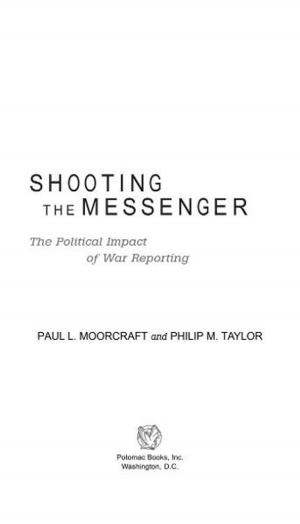The Specter of Munich
Nonfiction, Social & Cultural Studies, Political Science, International, International Security, International Relations, History, Military, World War II| Author: | Jeffrey Record | ISBN: | 9781597974493 |
| Publisher: | Potomac Books Inc. | Publication: | December 31, 2006 |
| Imprint: | Potomac Books Inc. | Language: | English |
| Author: | Jeffrey Record |
| ISBN: | 9781597974493 |
| Publisher: | Potomac Books Inc. |
| Publication: | December 31, 2006 |
| Imprint: | Potomac Books Inc. |
| Language: | English |
No historical event has exerted more influence on AmericaÆs postûWorld War II use of military force than the Anglo-French appeasement of Nazi Germany in the 1930s. Informed by the supposed grand lesson of Munichûnamely, that capitulating to the demands of aggressive dictatorships invites further aggression and makes inevitable a larger warûAmerican presidents from Harry Truman through George W. Bush have relied on the Munich analogy not only to interpret perceived security threats but also to mobilize public opinion for military action.
In The Specter of Munich, noted defense analyst Jeffrey Record takes an unconventional look at a disastrous chapter in Western diplomatic history. After identifying the complex considerations behind the Anglo-French appeasement of Hitler and the reasons for the policyÆs failure, Record disputes the stock thesis that unchecked aggression always invites further aggression. He proceeds to identify other lessons of the 1930s more relevant to meeting todayÆs U.S. foreign policy and security challenges. Among those lessons are the severe penalties that foreign policy miscalculation can incur, the constraints of public opinion in a modern democracy, and the virtue of consistency in threatening and using force.
The Specter of Munich concludes that though todayÆs global political, military, and economic environment differs considerably from that of the 1930s, the United States is making some of the same strategic mistakes in its war on terrorism that the British and French made in their attempts to protect themselves against Nazi Germany. Not the least of these mistakes is the continued reliance on the specter of Adolf Hitler to interpret today's foreign security threats.
In The Specter of Munich, noted defense analyst Jeffrey Record takes an unconventional look at a disastrous chapter in Western diplomatic history. After identifying the complex considerations behind the Anglo-French appeasement of Hitler and the reasons for the policyÆs failure, Record disputes the stock thesis that unchecked aggression always invites further aggression. He proceeds to identify other lessons of the 1930s more relevant to meeting todayÆs U.S. foreign policy and security challenges. Among those lessons are the severe penalties that foreign policy miscalculation can incur, the constraints of public opinion in a modern democracy, and the virtue of consistency in threatening and using force.
The Specter of Munich concludes that though todayÆs global political, military, and economic environment differs considerably from that of the 1930s, the United States is making some of the same strategic mistakes in its war on terrorism that the British and French made in their attempts to protect themselves against Nazi Germany. Not the least of these mistakes is the continued reliance on the specter of Adolf Hitler to interpret today's foreign security threats.
No historical event has exerted more influence on AmericaÆs postûWorld War II use of military force than the Anglo-French appeasement of Nazi Germany in the 1930s. Informed by the supposed grand lesson of Munichûnamely, that capitulating to the demands of aggressive dictatorships invites further aggression and makes inevitable a larger warûAmerican presidents from Harry Truman through George W. Bush have relied on the Munich analogy not only to interpret perceived security threats but also to mobilize public opinion for military action.
In The Specter of Munich, noted defense analyst Jeffrey Record takes an unconventional look at a disastrous chapter in Western diplomatic history. After identifying the complex considerations behind the Anglo-French appeasement of Hitler and the reasons for the policyÆs failure, Record disputes the stock thesis that unchecked aggression always invites further aggression. He proceeds to identify other lessons of the 1930s more relevant to meeting todayÆs U.S. foreign policy and security challenges. Among those lessons are the severe penalties that foreign policy miscalculation can incur, the constraints of public opinion in a modern democracy, and the virtue of consistency in threatening and using force.
The Specter of Munich concludes that though todayÆs global political, military, and economic environment differs considerably from that of the 1930s, the United States is making some of the same strategic mistakes in its war on terrorism that the British and French made in their attempts to protect themselves against Nazi Germany. Not the least of these mistakes is the continued reliance on the specter of Adolf Hitler to interpret today's foreign security threats.
In The Specter of Munich, noted defense analyst Jeffrey Record takes an unconventional look at a disastrous chapter in Western diplomatic history. After identifying the complex considerations behind the Anglo-French appeasement of Hitler and the reasons for the policyÆs failure, Record disputes the stock thesis that unchecked aggression always invites further aggression. He proceeds to identify other lessons of the 1930s more relevant to meeting todayÆs U.S. foreign policy and security challenges. Among those lessons are the severe penalties that foreign policy miscalculation can incur, the constraints of public opinion in a modern democracy, and the virtue of consistency in threatening and using force.
The Specter of Munich concludes that though todayÆs global political, military, and economic environment differs considerably from that of the 1930s, the United States is making some of the same strategic mistakes in its war on terrorism that the British and French made in their attempts to protect themselves against Nazi Germany. Not the least of these mistakes is the continued reliance on the specter of Adolf Hitler to interpret today's foreign security threats.















